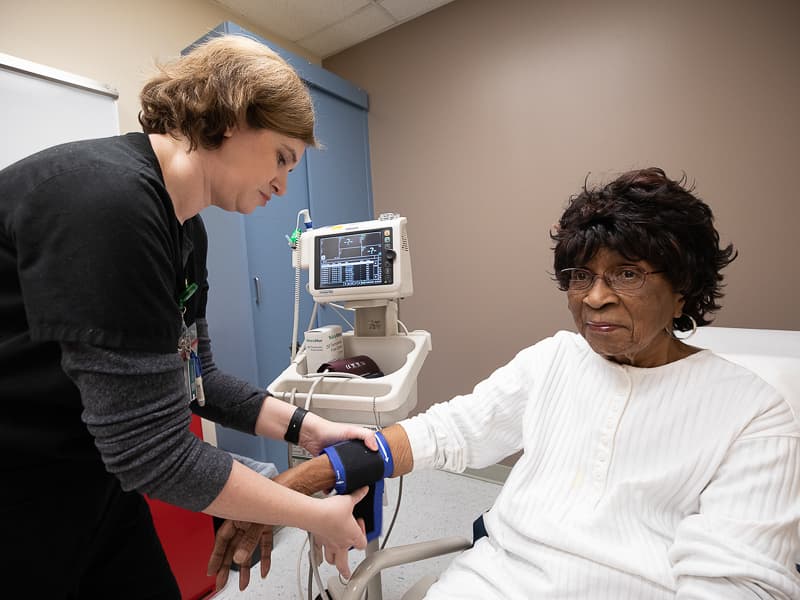SPRINT study shows lowering BP may help memory, cognition

Remembering to take your blood pressure medication may help you keep your memory and cognition sharp, according to a study published in the Journal of the American Medical Association Jan. 28.
In a study of more than 9,000 older adults, lowering blood pressure to a target of 120/80 mmHg did not reduce the risk for dementia, but it did decrease the risk of mild cognitive impairment, a precursor to dementia.

“We hear about eating blueberries or doing crossword puzzles to reduce the risk of [cognitive decline], but now we have evidence that controlling blood pressure is a way to reduce that risk,” said Dr. Alexander P. Auchus, professor and McCarty Chair of neurology at the University of Mississippi Medical Center and a co-author of the study.
UMMC was one of more than one hundred clinical sites for the Systolic Blood Pressure Intervention Trial, or SPRINT, which looked at the health benefits of aiming for a blood pressure of 120/80 mmHg in adults over 50.
High blood pressure, or hypertension, affects about one-third of American adults, including three-quarters of those age 65 or older. It causes damage to blood vessels and organs. Over time, this condition can damage the heart, kidneys and brain.
Learning if controlling blood pressure can have lasting brain-health benefits was the primary concern of the SPRINT Memory and Cognition in Decreased Hypertension, or MIND, component of the study. Now, this publication is one of the first to show evidence of an effective measure to prevent age-related memory and cognition issues.
“The brain is an organ, and it is dependent on circulation,” Auchus said. “Vascular health affects brain health because the brain relies on the cardiovascular system for nutrients and blood flow.”
When SPRINT began in 2010, Auchus was a faculty member at the University of Tennessee Health Sciences Center in Memphis. His role in SPRINT included adjudicating stroke events, or determining how to classify particular strokes for the purpose of the study. Hypertension is a significant risk factor for stroke, which in turn can lead to “damage that can contribute to cognitive problems and dementia,” he said.
Led by researchers at Wake Forest University, this latest publication from SPRINT compared two groups who had a starting systolic blood pressure of 130 mmHg or higher and at least one other cardiovascular disease risk factor. One group received standard care, which at the time meant trying to lower the patient’s blood pressure to140 mmHg systolic and 90 mmHg diastolic, or 140/90 mmHg. The second group had a more intensive goal of 120/80 mmHg.
During SPRINT, the investigators tested participants for signs of dementia or mild cognitive impairment using a series of assessments. Dementia is an umbrella term for conditions such as Alzheimer’s disease and vascular dementia. Mild cognitive impairment, or MCI, is a more common and less severe kind of mental decline. It doesn’t always develop into dementia, but dementia is almost always preceded by MCI.
But in 2015, study monitors stopped SPRINT’s hypertension protocol because the 120/80 mmHg group experienced a much lower cardiovascular disease rate. Continuing the trial would have been unethical and put undue risks on the standard blood pressure control group. However, the study continued to follow renal and cognitive outcomes through 2018.
“The results were so favorable for the intensive management group that all participants were advised to begin this intensive treatment,” Auchus said. “Because of that, the separation between the two groups was changed and we lost the ability to see differences between the study groups.”
Auchus notes that the trend in dementia was “in the right direction” – the intensive control group had about 16 percent fewer people develop dementia – but it wasn’t enough of a change to be statistically significant. In contrast, MCI occurrence was 20 percent lower in the 120/80 group.
“Dementia is a more severe condition where there has been more damage over more time,” Auchus said, whereas mild cognitive impairment develops more quickly. Therefore, this smaller change in cognitive ability may be easier to detect during a shorter time period.
Overall, the SPRINT MIND finding aligns with a prevailing hypothesis in dementia research: health vitals in midlife may prevent the disease decades later. In fact, the Alzheimer’s Association announced Jan. 28 that it has awarded $800,000 to continue researching the effect of intensive blood pressure control on dementia risk through a study called SPRINT MIND 2.0.
The SPRINT results have already influenced medical practice. The American Heart Association and the American College of Cardiology issued a 2017 statement recommending that clinicians lower the threshold for diagnosing hypertension from 140/90 to 130/80 mmHg.

“Results of the SPRINT study were considered along with other evidence to make decisions about the definition of hypertension and treatment goals,” said Dr. Daniel Jones, the Mississippi Center for Obesity Research’s director of clinical and population sciences and Mr. and Mrs. Joe F. Sanderson Jr. Chair in Obesity, Metabolic Diseases and Nutrition at UMMC.
Jones, one of the authors of the new guidelines, has several tips for people looking to manage their hypertension.
“For all of us, regular exercise and a healthy diet can improve blood pressure. Keys to this are to maintain a healthy weight, eat five servings a day of fresh vegetables or fruit, and to limit salt and alcohol intake,” Jones said. “For those with hypertension who are prescribed medications, taking medications regularly is very beneficial.”

